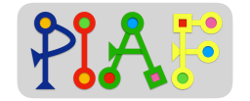CS unplugged: Computer Science without a computer
Short description
CS Unplugged is a collection of free teaching material that teaches Computer Science through engaging games and puzzles that use cards, string, crayons and lots of running around.
CS Unplugged covers a wide range of topics in Computer Science, like binary numbers, error detection and correction, image representation, robotics, searching algorithms and sorting networks. The website and the associated book propose lesson plans and printable learning materials that do not require the use of an electronic device, thus the name “unplugged”.
Material and technical aspects
The website Computer Science unplugged and its content is freely available on the website, it requires no special hardware and no access to electricity, apart from a printer to print out the printable learning materials to work with in class afterwards. All the activities are provided open source and have been released under a Creative Commons Attribution-ShareAlike license. You can make as many copies of the printable materials as you like and need for your class.
Content
CS unplugged has been developed by a competent team of authors, working in the field of Computer Science and its teaching. It covers a wide range of Computer Science topics, like binary numbers, error detection and correction, image representation, robotics, searching algorithms and sorting networks. CS Unplugged “presents fundamental concepts in Computer Science such as algorithms, artificial intelligence, graphics, information theory, human computer interfaces, programming languages, and so on. We want to emphasize that programming is a means, not an end.” In terms of the competences that are fostered here, “CS Unplugged activities teaches students how to: describe a problem, identify the important details needed to solve this problem, break the problem down into small, logical steps, use these steps to create a process (algorithm) that solves the problem, and then evaluate this process”. The activities tend to be about real computer science concepts and problems, like how do computer represent images or sound, how do sorting algorithms work. The activities are mainly available in English, but some of them have been translated into a variety of languages, like German and French. The worksheets can very often be used in any language context. For some activities there are explicit links to other curricular topics, like literacy, arts, music.
Pedagogical aspects
CS unplugged proposes learning activities that tend to be kinesthetic and collaborative. They require students to do things and discover answers for themselves and by themselves. They heavily rely on a constructivist teaching approach where students learn that they are “capable of finding solutions to problems on their own”. The activities are also meant to be engaging and fun. The role of the teacher is to lay out the materials and tell the student a few rules, and students are supposed to confront the challenges from there. Students are allowed to make mistakes, to try out things for themselves, to discover and experiment the phenomena at hand and to present and discuss the solutions they developed. The different activities are target to students aged 5-10 and 5-14.
Conclusion
Overall CS unplugged is a wonderful and rich resource for teachers who wish to teach a wide range of topic in the field of computer science and to develop computational thinking skills in their fundamental school students while not relying on the use of an electronic computer. This allows them to focus on the thinking part of these types of problem-solving activities that computational thinking implies. The learning activities heavily rely on learning by doing, learning by discovering, learning by experimenting, learning together with other students and on having fun while exploring a wide range of topics in computer science. In addition, all the activity plans and materials are freely and openly available to use in your classroom. A highly recommendable resource!

